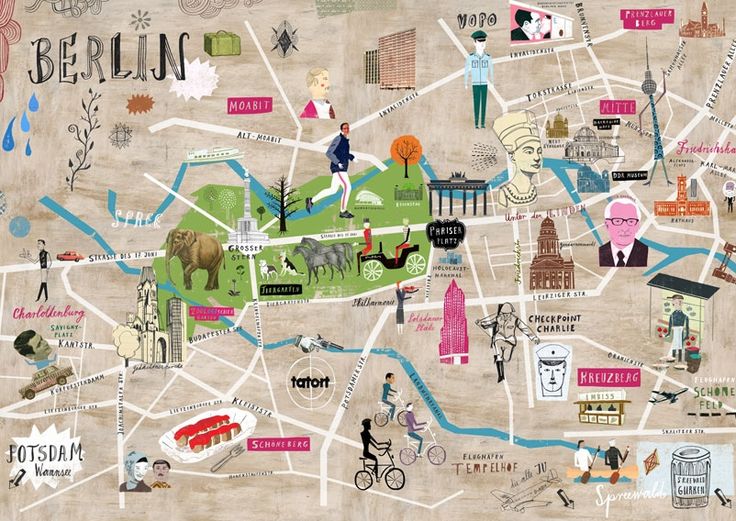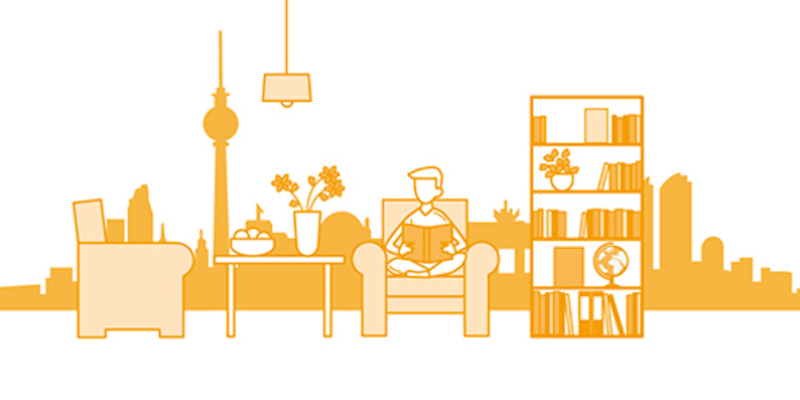
If you meet someone who is living in Berlin, ask them this question – “How did you find your place?” In the majority of cases, the answer starts with a big sigh.
Looking for and finding a place to live in Berlin can be a real struggle
First things first: Apartments in Germany do not come furnished, or, if they do, you’ll have to fork over a lot of money. Most cities I lived in before offered a good mix of furnished and unfurnished apartments. But the situation isn’t quite the same here. Most apartments are unfurnished, and by unfurnished I mean you might get a kitchen sink if you’re lucky.
I came into this city wide-eyed and assumed, “Hey, I’ve moved countries seven times in the past two years, I’ve got this.” But it’s a bit more of a challenge than I expected.
Looking to rent is like looking to buy. Most of the apartments come stripped of all furniture. All! I mean you have to bring your own kitchen sink. Empty.
And that’s for a good reason.
Landlords expect people are moving in for a long time. A decade. Or forever. The city’s real estate market isn’t really tailored to the ‘nomadic,’ minimalistic lifestyle. People don’t just move two bags in, they come with their beds, their wardrobes, their kitchen.
Options in Berlin
You’ve made the decision to move to Berlin. So what are your options?
First, you’re going to have to find some sort of temporary accommodation. Whether it’s a hotel, hostel or a short-term rental such as an Airbnb, you’re going to see money flying right out of your wallet those first few days/weeks/months.
Second, have a cheat sheet with the basic vocab. You’re going to need it for your search. While Berlin is open to foreigners, it’s always easy if you understand what’s going on. Not limiting yourself to posts in English can also help you find success earlier.
The housing terms you need to know:
- Wohnung – apartment
- Zimmer – room
- Miete – rent
- Warm und kalt miete – warm and cold rent – warm rent includes utilities, cold doesn’t
- WG – flat share
- EBK – built-in kitchen. You might want to add this to your search if you’re not planning on buying your own kitchen anytime soon
- Anmeldung – registration
- WBS (Wohnberechtigungsschein) – social services housing voucher. You don’t have this, you just arrived, so skip all ads that have these three letters in the title
- Schufa – your German credit score. If you’re new to the city you don’t have this. Once you’re registered as living in Germany you’ll get one. (nota bene: real estate agencies can check it on your behalf and you don’t have to fork up 30 euros every time someone asks for it)
The Anmeldung vicious cycle
You have to have an Anmeldung and Schufa to rent and you have to rent to have an Anmeldung. (You’re using your cheat sheet, right?) From my experience, this cycle can be broken when renting from an individual rather than a real estate agency.
Make a list of needs, wants and expectations and cut it down to the bare minimum. It’s like having a negotiation with yourself. Do you really need two rooms, or will 1.5 do? Or to put it in simple English, do you really need a bedroom or will a sleeping nook for your bed do?
Now that you’ve dwindled down the options, contact the person or agency who posted the ad.
Keep in mind that:
• if an apartment looks too good to be true, it probably is.
• you’ll need to set up viewings. More than you think you need will probably not be enough.
• agencies especially like setting meetings during working hours. It’s their job, your need, so you’re going to have to adapt.
• you’ll be competing against 20 other people for each and every apartment you see.
Expect weird things for sale
Sometimes the person leaving the apartment doesn’t want to lug furniture around so they will put it on offer with the rental.
We once saw a place where both the kitchen furniture and the flooring were for sale. What if nobody wanted to pay for the flooring? Would they have taken it out?
Sublets
Subletting is very common. Some people sublet their room for as little as a week or two while they’re away on vacation. This may be a temporary solution if you need a base for your search.
Rent costs
When getting a new place, you’re not fully free to choose your own price point. The rule of thumb in the city is that you have to earn at least three times the warmmiete.
Landlords here do not take chances; they want you to meet a certain list of standards or requirements. If you’re not earning enough, they will not rent you the place. This is especially valid when it comes to agencies. The required deposit is typically between one and three month’s rent.
The flat share option – the WG
If you want to keep your living costs down, you might want to look for a WG – a flatshare. Many of the rooms come furnished and at least you know you already have the basics. It doesn’t leave a lot of room for privacy but, hey, they say 30 is the new 20, so we can live like students.
Pay close attention to your flatmates as well. You want to make sure your new home feels safe.
Living where you work is an increasingly popular option, with several co-working/co-living companies moving into the Berlin market.
The good news
Due to the spike in rental prices and the subsequent protests, a Berlin-local law has recently passed that caps the maximum amount a landlord can charge. The rent will, therefore, be capped at 9.80 euros per square meter starting February 2020. This doesn’t apply to new builds (after 2014) and WBS. But if nothing else, it is a good reference point for your apartment search.
To sum up:
- Apartments in Berlin come unfurnished
- Find temporary accommodation
- Get your language cheat sheet
- Apply for a bunch of apartments
- Go to the viewings
- Consider a WG
- Stay safe
- Good luck!
Also see:
• Laura Kaye’s post, “Finding an apartment in Berlin’s crazy housing market.”
• Shari Boden’s post, “My best tips for making your Berlin apartment search easier.”

About the author:
Meda Harsan has a passion for travel and writing. She has a background in television, financial and IT services. Meda brings her critical eye and wit to everyday life.
She’s taken a break from a career at some of the world’s biggest corporations to explore the globe and herself.
Meda has lived in the United Kingdom, Australia, Poland, Romania and is now living in Berlin.














